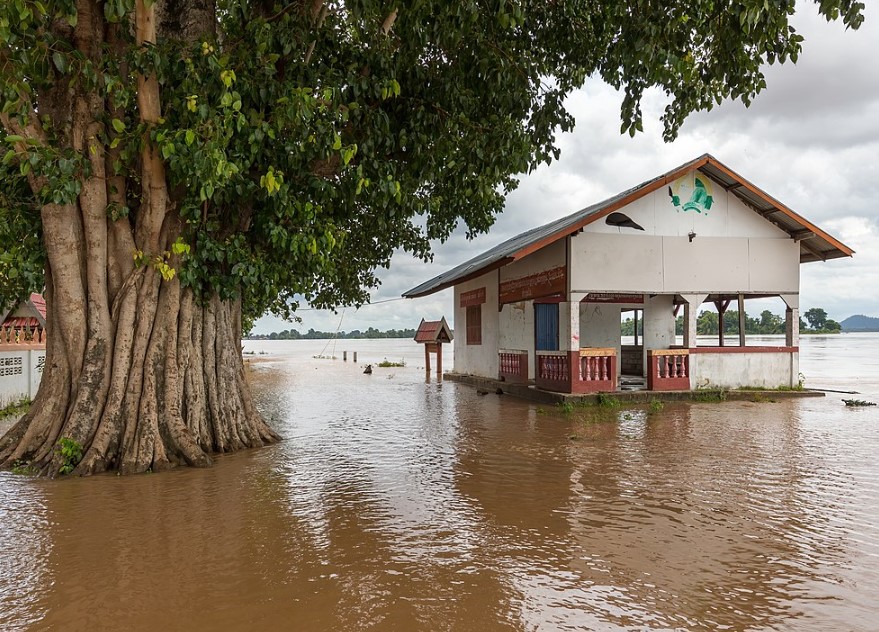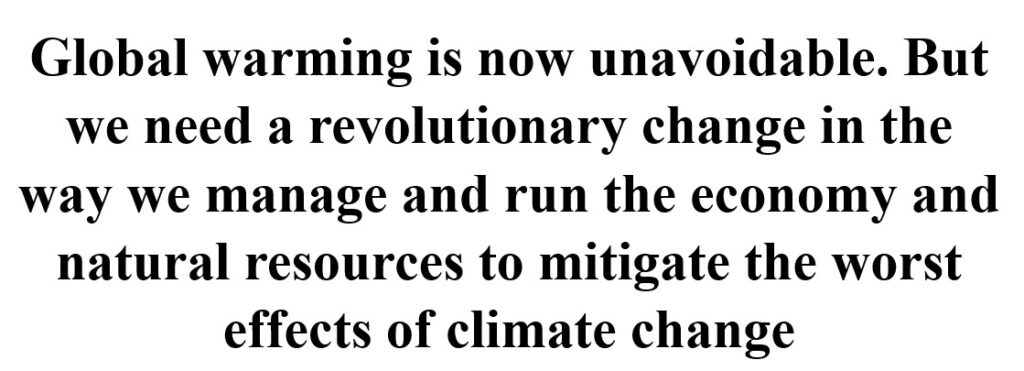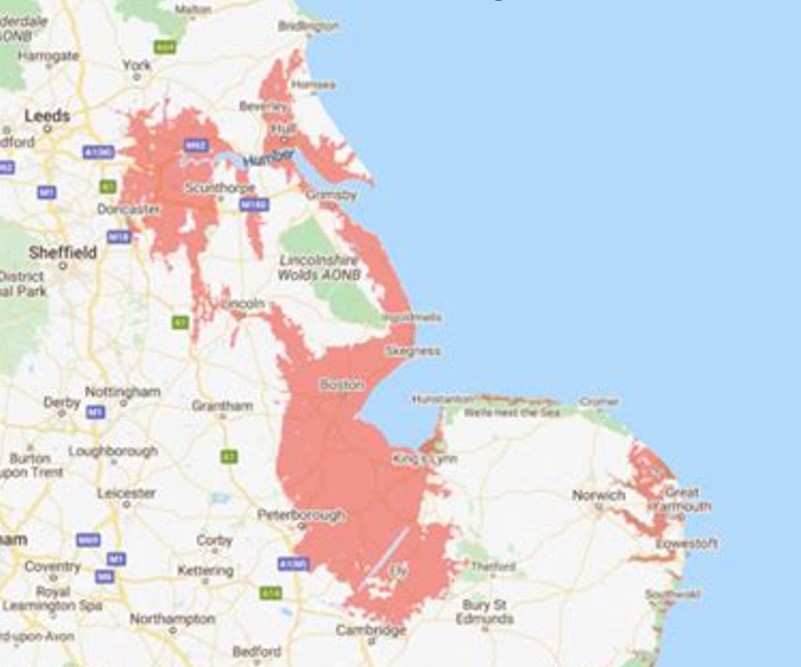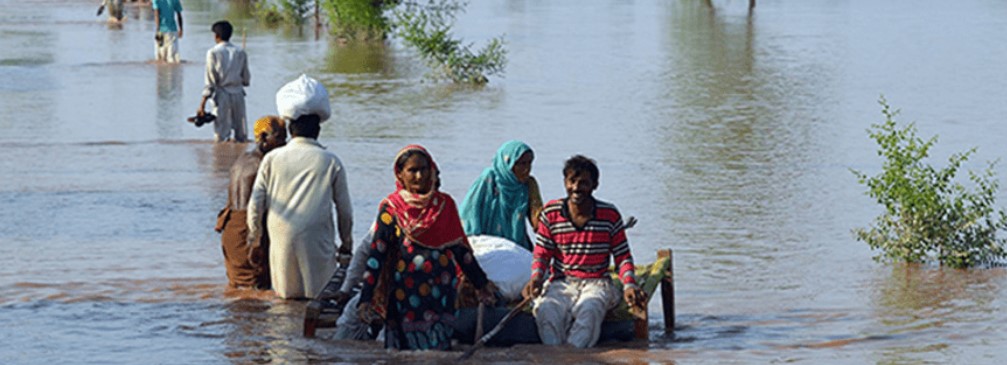Part 2: the world is drowning
By Mike Kennard, SE Cambridgeshire Labour member
In Part 1, we look at changing temperature and the increased incidence of wildfires. This section looks at shifts in rainfall patterns, increased flooding and the role of oil and gas companies.
Throughout the world, rainfall patterns have been disturbed to an unprecedented scale, with in some cases, the amount of rain falling in days or weeks which previously would have fallen over months. Coupled with other human interventions such as deforestation of upland areas and alteration of river courses, this is leading to catastrophic flooding episodes.
Last year saw large swathes of Pakistan devastated by huge floods – an area larger than the UK was inundated – which killed nearly 1,500 people and left more than 30 million displaced [Picture top]. Monsoon rains are notably heavy, but that August rainfall was 243% above average, peaking above average at 726% in Sindh province and 590% in Baluchistan.
This year, India has just been forced to restrict rice exports because excessive monsoon rains have ruined the rice crop. Over 1 million homes were destroyed or damaged, and agriculture was devastated. Already in 2023 heavier than average monsoon rains are compounding the misery.
Abnormal flooding events attributed to climate change have occurred, among others, in Louisiana in 2016, in Texas in 2017, in France in 2016, in Mozambique in 2000-2023, in Vietnam in 2020 and 202217and in New Zealand in 2022. Flooding is a natural occurrence but rainfall events have increased in frequency, intensity and have changed in distribution – Northern Europe is experiencing more incidents while there is a long-term decrease in Southern Europe (although Emilia-Romagna province in Italy saw 23 rivers burst their banks in 2023).
Major cities located near the sea
An even more devastating product of global warming is rising sea levels. Many small island nations face virtual extinction as they are engulfed by the inexorable rise in atmospheric and ocean temperatures leading to thermal expansion of the sea coupled with melting ice caps and glaciers.
The impending catastrophe is not limited to the island nations – many of the world’s major cities are located on coasts or in estuaries. New York, London, Cairo and many others will be seriously affected in the foreseeable future by the projected minimum raise of 25cm.
Nearly 40% of the US population lives in coastal areas. Lowland cultivation accounts for a substantial part of the world’s agriculture, with rice growing in Bangladesh and Vietnam seriously threatened. In the UK, the Fens of Lincolnshire, Cambridgeshire and Norfolk which are near or even below current sea level, provide 37% of England’s vegetable output and are at risk of disappearing by 2050 in the worst case scenario, but certainly by the end of the century if immediate and radical action is not taken.
The loss to sea level rise of agricultural land throughout the world will cause considerable economic and social upheaval, including forced migration, starvation and conflict over resources.

Profit or survival?
For 50 years oil and gas companies obstructed and suppressed research into alternative energy sources, researching and buying up patents in order to keep them from development and opposing government funding for research (Guardian, May 20, 2016).
Esso, forerunner of ExxonMobil, obtained three fuel cell patents and, along with Shell and Phillips, patented more fuel-efficient vehicles which never saw the light of day. In 2015, a leak of internal documents showed that ExxonMobil showed that the company’s own research had been aware of global warming and its causes as far back as 1977, but continued to suppress the data until 2014.
Sanctions on Venezuela, Iran and Russia have been especially beneficial to US capitalism. War, of course, is good for business. Russia’s invasion of Ukraine has given Western oil and gas companies a record profit bonanza, while passing the misery of high energy prices onto consumers. The invasion of Iraq twenty years ago was not about ‘weapons of mass destruction’ or ‘terrorism’ but control of Iraq’s oil.
In the UK, Shell and BP operating in the North Sea pay no tax but claim grants for decommissioning of redundant oil rigs and at the same time for further exploration. Their super profits come from selling oil and gas at world market prices, even though they are extracted from British waters. It is worth noting that Norway has a different policy, retaining control of its natural resources and using revenue and taxation to create a huge sovereign wealth fund, currently around £1.4tr, the largest in the world per head of population.
The fossil fuel giants do invest in alternative energy as the damaging effect of their output has become exposed and they spend large amounts on greenwashing while at the same time continuing their search for new oil and gas fields. In 2002, seeing the writing on the wall, BP relaunched its image with a “Beyond Petroleum” campaign pledging to hold emissions constant. But this image took major blows with the 2006 Alaskan oil pipeline spill and the 2010 Deepwater Horizon blow-out in the Gulf of Mexico, the biggest marine oil spill in history, so the new policy was quietly dropped.
The companies also spends substantial sums buying politicians to protect their interests; the most blatant examples of this were the father and son Bush administrations in the USA, where policy was dictated by senior oil executives like Rumsfeld and Cheney who sat right at the heart of government.
Companies go ‘green’ while keeping quiet about exploiting new oil and gas fields
Greenwashing is big business. PR companies grow rich by spreading the word of how fossil fuels producing countries and companies are becoming ‘green’, while keeping quiet about exploration and development of hew fields.
A whole new market opportunity was opened up with carbon trading, where polluters could buy ‘carbon credits’ from agriculture and companies which have carbon-consuming technologies, and with carbon offsetting schemes such as tree planting. In many cases, these would take place anyway and the schemes are smokescreens to allow the polluters to continue on their destructive path.
Major diversions from reducing fossil fuel consumption are Carbon Capture, whereby carbon dioxide gas is drawn from the atmosphere and used in industrial processes, and Carbon Capture and Storage (CCS) which takes CO2 from industrial processes and stores it underground. A new plant in Cheshire has opened up which will pump CO2 into former natural gas reservoirs under the Irish Sea, but when pressed, a company spokesperson admitted that once the reservoir is full the plant could not operate in the same way, showing that this can be no more than a stop-gap measure.

In any case, the amount processed by these schemes is miniscule compared to the amount of CO2 already in the atmosphere and ongoing emissions. CCS is really a smokescreen or a ‘fig-leaf’ to give the public impression that there is a technological ‘fix’ at hand, when in fact it is no solution. Meanwhile, governments and companies continue to pump greenhouse gases.
While major companies make enormous profits from polluting processes and have governments do their bidding, there is little hope that global temperature targets can be met.

It is likely that Labour will win the general election next year, but the Starmer leadership have already rowed back even on their limited ambitions. The Green Prosperity Plan has been postponed (shelved) in favour of “fiscal responsibility” (ie continued Tory austerity), along with most of the leadership’s other promises.
There can be no solution to the climate crisis under capitalism, where corporate profit is the driving motive and where public policy and politicians are driven by the needs of the oil, coal and gas industries. The privatisation of the publicly owned utilities must be reversed, with National Grid taken back into public ownership.
There should be investment in renewable energy, with manufacturing resources directed to those areas where employment will be affected by the abandonment of fossil fuels. Research must be prioritised into more efficient production of renewable energy, especially geothermal and tidal generation, both unaffected by weather.
Public transport must be developed, with renationalisation of rail and municipalisation of buses, making it possible for people to reduce the use of private cars. Only governments in the UK and elsewhere can carry through these measures. The old slogan used to be “Socialism or barbarism”; the modern equivalent is “Socialism or extinction”.
It is a sombre picture that faces humanity at the present time. It is too late for socialism to stop global warming: it is now unavoidable. But we need a revolutionary change in the way we manage and run the economy and natural resources to mitigate the worst effects of human-made climate change and at least give humanity a fighting chance of surviving the next few centuries.



